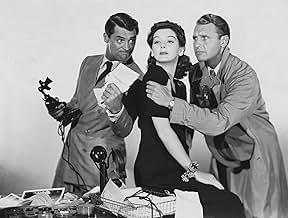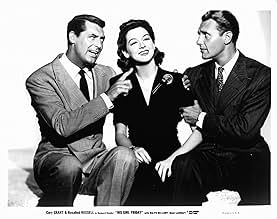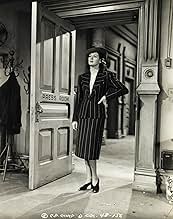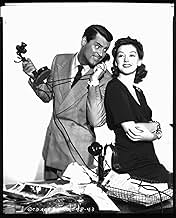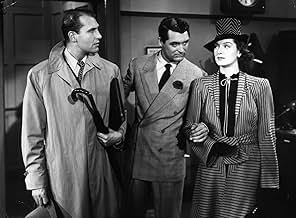Un editor de periódico intenta evitar por todos los medios que su exmujer, una experta reportera, se vuelva a casar.Un editor de periódico intenta evitar por todos los medios que su exmujer, una experta reportera, se vuelva a casar.Un editor de periódico intenta evitar por todos los medios que su exmujer, una experta reportera, se vuelva a casar.
- Dirección
- Guionistas
- Elenco
- Premios
- 5 premios ganados y 1 nominación en total
Opiniones destacadas
This gloriously funny romp by Howard Hawks is rightly remembered as one of the fastest-talking movies ever made. Originally done as 'The Front Page', the play by Hecht and McArthur takes on new life here as the character of Hildy Johnson metamorphoses in this version to be a sparky woman (played by Rosalind Russell), former wife of the harassed columnist Walter Burns (played with characteristic bewilderment and charm by Cary Grant). Hildy is about to marry again, to the nice but dull Bruce Baldwin (played by Ralph Bellamy as a character so boring he 'is like Ralph Bellamy' - how Hollywood liked its in-jokes).
With that fire-cracking script, a sizable amount of sparks between Grant and Russell, and good support from Bellamy and a cast which includes Gene Lockhart, Cliff Edwards, Clarence Kolb, and Regis Toomey, 'His Girl Friday' is one of those classic gems which never age and which remain hugely entertaining.
With that fire-cracking script, a sizable amount of sparks between Grant and Russell, and good support from Bellamy and a cast which includes Gene Lockhart, Cliff Edwards, Clarence Kolb, and Regis Toomey, 'His Girl Friday' is one of those classic gems which never age and which remain hugely entertaining.
If Howard Hawks's screwball classic "His Girl Friday" isn't a perfect film, it had at least a perfect role for Cary Grant and Rosalind Russell... and that's the stuff durable greatness is made of.
Indeed, Grant was the epitome of wisecracking charm and his Walter Burns happened to be an obnoxious fellow delivering so many wisecracks that by the time the receiver found the proper repartee, someone was already being verbally crucified.
Rosalind Russell wasn't a star... yet... until she portrayed Burns' ace reporter and ex-wife Hildy Johnson, reliable and relatable 'girl Friday'. These two backgrounds explain why she plays in the same rhetorical league, she's a match to him... even when there's no matching anymore.
But maybe because she's taller than many actresses, she can get above Grant's shoulder high enough not to be totally swollen off by his charismatic despicability. She talks the talks but can walk the walk even if he's gallant enough to hold her the door... but why would a woman calling herself a newspaperman expect gallantry?
At a time where gender talk wasn't such a sensitive subject and this is where the film got tricky, Hildy is engaged to insurance agent Bruce Baldwyn and is determined to become his devoted housewife, to have children and live a peaceful life in Albany, of all the towns... so she expects some gentlemanly behavior from her editor and former husband... might as well expect Hitler to sign a Peace Treaty.
The titular 'Girl Friday' can't wait for her existential 'week-end', torn between her job and her future. The way the film makes these two situations irreconcilable can seem far-fetched but given the way Hildy handles her job, it's hard to imagine the combo. The lady must make up her mind. Meanwhile, Burns gets an opportunity that instantly tilts in his mind "thanks God, it's Friday!".
As usual with screwball comedies, the timing is crucial and when a top reporter is missing and an execution is polarizing opinions because of proclaimed insanity and suspicion of political motivations, someone must cover the news and Hildy happened to be in the right place at the right moment.
For Walter, Hildy's presence is to be exploited even if it means using every bit of his malevolent creativity against the gentle but rather bland Bruce... who looks exactly like Ralph Bellamy, according to Burns (or was it Grant having fun with the script?). Given the mistreatment poor Bruce undergoes, "His Girl Friday" is a tale of Machiavellian ingenuity at the services of one profession: journalism. Basically, the ends justify the means if it means covering the hottest topic of the day (pre-war days but they didn't know).
So Burns uses every trick of his sleeve to prevent Bruce from taking the train and forces Hildy to be on the front... and for the front, fully aware that her professional conscience will finally get the best of her. And there is something in Russell's performance, the way she resists the call of her profession while being fiercely attached to her fiancée that calls for admiration.
Whether she handles the other journalists who pose like vulture-like creatures, indifferent to the pleas of Williams' friend and hungry for any scandal or tip to it, she knows how to adapt her manners, to talk different languages, but that would be too easy with screwball comedy. We noticed from the start that the pace of the dialogue is as quick as if the box office depended on it, yet Hawks gratifies us with scenes where journalists and Burns are all together, sometimes, Bruce and Walter talk to Hildy and on the phone and the rhythm is so fast it sounds like harmonious cacophony.
The film was known for having a dialogue that could be contained in a twice longer film but Hawks insisted on having something natural that could flow simply and easily because people did talk like this in real life. And only for the rapid fire delivery of Russell, I'm glad they didn't take someone else, I can't imagine Katharine Hepburn in that role, Russell had the street smarts, the modern touch, the look, the sexiness... she got the scandal but the only thing she didn't get was an Oscar nomination, and that was a scandal too.
I didn't like the film at first because I have a problem with the schematic aspect of screwball comedies, the two men in love with the same woman and one of them has no chance because the other is Grant, that's why I didn't like "The Philadelphia Story"... but here, Grant is so unlikable you've got to wonder how come he had to get Russell at the end except to show that these two were equally unlikable thus meant to be together, which in that case makes the film modern in its daring anti-family bias.
And the ending doesn't imply that Hildy made the right personal choices, maybe journalists have a way with every non-personal matters but are totally ignorant of the things of life. I recently saw "Sweet Smell of Success" and I guess it's a common trope of Hollywood to depict journalism as a business dealing with cops, politicians, uses of bribes or blackmails and many methods that can only give it a cynical flavor.
Grant could embody these traits without being totally detestable, maybe it's because we try to see them from the eyes of Hildy and we accept that he's not such a bad guy after all. Ironically, when Hildy becomes the newspaper man, she lets the woman takes the upper hand and encourage Burns to show a more comprehensive and gentle side. But Hawks was a smart director, if he was smart enough to know that he could remake "The Front Page" with a gender swap, he could handle his characters as well.
After all, they might be unlikable but they have a likable way to be unlikable, and that's also the stuff durable greatness is made on.
Indeed, Grant was the epitome of wisecracking charm and his Walter Burns happened to be an obnoxious fellow delivering so many wisecracks that by the time the receiver found the proper repartee, someone was already being verbally crucified.
Rosalind Russell wasn't a star... yet... until she portrayed Burns' ace reporter and ex-wife Hildy Johnson, reliable and relatable 'girl Friday'. These two backgrounds explain why she plays in the same rhetorical league, she's a match to him... even when there's no matching anymore.
But maybe because she's taller than many actresses, she can get above Grant's shoulder high enough not to be totally swollen off by his charismatic despicability. She talks the talks but can walk the walk even if he's gallant enough to hold her the door... but why would a woman calling herself a newspaperman expect gallantry?
At a time where gender talk wasn't such a sensitive subject and this is where the film got tricky, Hildy is engaged to insurance agent Bruce Baldwyn and is determined to become his devoted housewife, to have children and live a peaceful life in Albany, of all the towns... so she expects some gentlemanly behavior from her editor and former husband... might as well expect Hitler to sign a Peace Treaty.
The titular 'Girl Friday' can't wait for her existential 'week-end', torn between her job and her future. The way the film makes these two situations irreconcilable can seem far-fetched but given the way Hildy handles her job, it's hard to imagine the combo. The lady must make up her mind. Meanwhile, Burns gets an opportunity that instantly tilts in his mind "thanks God, it's Friday!".
As usual with screwball comedies, the timing is crucial and when a top reporter is missing and an execution is polarizing opinions because of proclaimed insanity and suspicion of political motivations, someone must cover the news and Hildy happened to be in the right place at the right moment.
For Walter, Hildy's presence is to be exploited even if it means using every bit of his malevolent creativity against the gentle but rather bland Bruce... who looks exactly like Ralph Bellamy, according to Burns (or was it Grant having fun with the script?). Given the mistreatment poor Bruce undergoes, "His Girl Friday" is a tale of Machiavellian ingenuity at the services of one profession: journalism. Basically, the ends justify the means if it means covering the hottest topic of the day (pre-war days but they didn't know).
So Burns uses every trick of his sleeve to prevent Bruce from taking the train and forces Hildy to be on the front... and for the front, fully aware that her professional conscience will finally get the best of her. And there is something in Russell's performance, the way she resists the call of her profession while being fiercely attached to her fiancée that calls for admiration.
Whether she handles the other journalists who pose like vulture-like creatures, indifferent to the pleas of Williams' friend and hungry for any scandal or tip to it, she knows how to adapt her manners, to talk different languages, but that would be too easy with screwball comedy. We noticed from the start that the pace of the dialogue is as quick as if the box office depended on it, yet Hawks gratifies us with scenes where journalists and Burns are all together, sometimes, Bruce and Walter talk to Hildy and on the phone and the rhythm is so fast it sounds like harmonious cacophony.
The film was known for having a dialogue that could be contained in a twice longer film but Hawks insisted on having something natural that could flow simply and easily because people did talk like this in real life. And only for the rapid fire delivery of Russell, I'm glad they didn't take someone else, I can't imagine Katharine Hepburn in that role, Russell had the street smarts, the modern touch, the look, the sexiness... she got the scandal but the only thing she didn't get was an Oscar nomination, and that was a scandal too.
I didn't like the film at first because I have a problem with the schematic aspect of screwball comedies, the two men in love with the same woman and one of them has no chance because the other is Grant, that's why I didn't like "The Philadelphia Story"... but here, Grant is so unlikable you've got to wonder how come he had to get Russell at the end except to show that these two were equally unlikable thus meant to be together, which in that case makes the film modern in its daring anti-family bias.
And the ending doesn't imply that Hildy made the right personal choices, maybe journalists have a way with every non-personal matters but are totally ignorant of the things of life. I recently saw "Sweet Smell of Success" and I guess it's a common trope of Hollywood to depict journalism as a business dealing with cops, politicians, uses of bribes or blackmails and many methods that can only give it a cynical flavor.
Grant could embody these traits without being totally detestable, maybe it's because we try to see them from the eyes of Hildy and we accept that he's not such a bad guy after all. Ironically, when Hildy becomes the newspaper man, she lets the woman takes the upper hand and encourage Burns to show a more comprehensive and gentle side. But Hawks was a smart director, if he was smart enough to know that he could remake "The Front Page" with a gender swap, he could handle his characters as well.
After all, they might be unlikable but they have a likable way to be unlikable, and that's also the stuff durable greatness is made on.
Charles McArthur and Ben Hecht met when both were reporters in Chicago during the 1920s. They created two of the funniest farces in American drama, TWENTIETH CENTURY (about theater people) and THE FRONT PAGE. The latter was based on their experiences as news reporters in those crazy days in Chicago, where the newspapers concentrated on sensationalism and the politics was thoroughly corrupt. The resulting play is hysterically funny and yet remains timely. For all the exaggeration of how Walter Burns and Hildy Johnson manipulate police, politicians, reporters, and civilians to get their scoop, the story remains relevant for several reasons. The political balance in a big Mayoralty election is precarious due to the Earl Williams case. Williams has shot a policeman who is African-American, a big local voting block, and they want him punished. The corrupt Mayor and his idiot jail warden are willing to execute him for the votes needed to stay in office, but the Governor (who is from the rival party) believes the killer is insane (or at least mentally deficient). So already (as you see) race, politics, and the validity of the death penalty get pulled in. Soon we also see examples of nepotism and corruption in the police, and City Hall, cynical politics based on a man's life, and questions about privacy and a free press. For a play from 1931 this one still has relevance.
There had been an earlier version of the play in the 1930s called THE FRONT PAGE, starring Adolphe Menjou as the conniving and devious Walter Burns, and Pat O'Brien as ace reporter Hildy Johnson. It is a good version, and both stars do well with their parts (and both have the verbal speed necessary for the dialog to flow over the ears of the audience). But when the film was remade in 1940, Howard Hawks decided to redraw Hildy Johnson into a female reporter (and previous wife) of Burns. His casting of Cary Grant was radically different too. Burns is a nasty, conniving s.o.b. who would kill for a good story. Menjou was somewhat dapper (he was usually dapper) in the role, but the hardness under the presentable shell was there. And by changing Hildy from a guy to a gal, and Walter's former wife, you had to make Walter look more interesting. So Walter is turned into Cary Grant. There was a search for Hildy, involving Jean Arthur and Irene Dunne as possibilities. Neither ended up playing him. Instead it went to Rosalind Russell.
It has to be admitted Russell had the vocal abilities to push the dialog at the proper clip. Possibly Jean Arthur could have done that just as well, but Arthur did not have the apparent physical strength behind the stylishness that Russell showed. She really does balance well (in this film) with Grant, given their characters.
Motivation changes a little. This Walter Burns still wants to get his scoops, but there are moments of fragility when he realizes he may forever lose Hildy to her fiancé Bruce (the ever helpless Ralph Bellamy). And they oddly work (Hawks manages to keep them under control). Also, as the story is now twelve years older than the original play, certain changes occur in Walter's political views. He does dislike the gang (led by Clarence Kolb and Gene Lockhart) running the city, and points out to Hildy that they have a chance to help give the city the sort of government New York City has under La Guardia. This does not end his joy at scooping the opposition, but it does suggest that Burns has more depth.
It is now generally believed that this is the best of the film versions of THE FRONT PAGE, and one of the funniest films ever made. The entire cast shines (look at the scene where Helen Mack confronts the reporters who have made her look like a tramp, and have told lies about John Qualen (Williams) - she is in a state when Russell takes her out of the press room, and the reporters are thoroughly ashamed of herself - and Russell comes back looking at Regis Toomey, Porter Hall, and the others, and says "Gentlemen of the Press!" with heavy cynical irony). And also note Billy Gilbert's immortal Joe Pettibone, the most hopeless monument of total befuddlement in movies. It is one of the few film comedies of that period that retains it's laughs one viewing following another.
There had been an earlier version of the play in the 1930s called THE FRONT PAGE, starring Adolphe Menjou as the conniving and devious Walter Burns, and Pat O'Brien as ace reporter Hildy Johnson. It is a good version, and both stars do well with their parts (and both have the verbal speed necessary for the dialog to flow over the ears of the audience). But when the film was remade in 1940, Howard Hawks decided to redraw Hildy Johnson into a female reporter (and previous wife) of Burns. His casting of Cary Grant was radically different too. Burns is a nasty, conniving s.o.b. who would kill for a good story. Menjou was somewhat dapper (he was usually dapper) in the role, but the hardness under the presentable shell was there. And by changing Hildy from a guy to a gal, and Walter's former wife, you had to make Walter look more interesting. So Walter is turned into Cary Grant. There was a search for Hildy, involving Jean Arthur and Irene Dunne as possibilities. Neither ended up playing him. Instead it went to Rosalind Russell.
It has to be admitted Russell had the vocal abilities to push the dialog at the proper clip. Possibly Jean Arthur could have done that just as well, but Arthur did not have the apparent physical strength behind the stylishness that Russell showed. She really does balance well (in this film) with Grant, given their characters.
Motivation changes a little. This Walter Burns still wants to get his scoops, but there are moments of fragility when he realizes he may forever lose Hildy to her fiancé Bruce (the ever helpless Ralph Bellamy). And they oddly work (Hawks manages to keep them under control). Also, as the story is now twelve years older than the original play, certain changes occur in Walter's political views. He does dislike the gang (led by Clarence Kolb and Gene Lockhart) running the city, and points out to Hildy that they have a chance to help give the city the sort of government New York City has under La Guardia. This does not end his joy at scooping the opposition, but it does suggest that Burns has more depth.
It is now generally believed that this is the best of the film versions of THE FRONT PAGE, and one of the funniest films ever made. The entire cast shines (look at the scene where Helen Mack confronts the reporters who have made her look like a tramp, and have told lies about John Qualen (Williams) - she is in a state when Russell takes her out of the press room, and the reporters are thoroughly ashamed of herself - and Russell comes back looking at Regis Toomey, Porter Hall, and the others, and says "Gentlemen of the Press!" with heavy cynical irony). And also note Billy Gilbert's immortal Joe Pettibone, the most hopeless monument of total befuddlement in movies. It is one of the few film comedies of that period that retains it's laughs one viewing following another.
Cary Grant and Rosalind Russell make great sparring partners in "His Girl Friday," a remake of "The Front Page."
Grant plays the conniving newspaper publisher Walter Johnson, and Rosalind Russell is the reporter Hildy Johnson, a woman this time, and Johnson's ex-wife. She's trying to get remarried, move to Albany, and quit the newspaper business, but Walter can't bear it.
He cons her into helping out with a controversial death row case and then makes sure her fiancée (Ralph Bellamy) suffers a series of mishaps - arrest for stealing a watch, arrest for "mashing," arrest for counterfeiting, and the theft of his wallet.
This all happens while Hildy interviews Earl Williams, a man due to be hung the next day... and then hides him in a roll-top desk in the courthouse press room when he escapes during a psychiatric evaluation.
It's madcap, all right, and there are no two better people to carry it off than Grant and Russell, who make a great team. It's a hilarious story, with the most rapid-fire, non-stop dialog ever heard anywhere, often with several conversations going on at once. It's exhausting trying to keep up with it.
Strangely, without computers and cell phones, the story of journalists working on a story holds up because the emotions and activities are realistic and still go on. It's as Hildy describes - no set schedule, no normal meals, and long hours. Nothing much has changed.
This is a frenetic comedy, and while the impending hanging of Earl Williams is certainly serious, this plot is more of an excuse to observe the machinations of Hildy and Walter - it's a subplot, though it drives the main story.
"The Front Page" is a favorite of Hollywood's, remade many times - three versions under its original title, a TV series, two TV productions, plus the film "Switching Channels." And of course, "His Girl Friday," possibly the best of all of them.
Grant plays the conniving newspaper publisher Walter Johnson, and Rosalind Russell is the reporter Hildy Johnson, a woman this time, and Johnson's ex-wife. She's trying to get remarried, move to Albany, and quit the newspaper business, but Walter can't bear it.
He cons her into helping out with a controversial death row case and then makes sure her fiancée (Ralph Bellamy) suffers a series of mishaps - arrest for stealing a watch, arrest for "mashing," arrest for counterfeiting, and the theft of his wallet.
This all happens while Hildy interviews Earl Williams, a man due to be hung the next day... and then hides him in a roll-top desk in the courthouse press room when he escapes during a psychiatric evaluation.
It's madcap, all right, and there are no two better people to carry it off than Grant and Russell, who make a great team. It's a hilarious story, with the most rapid-fire, non-stop dialog ever heard anywhere, often with several conversations going on at once. It's exhausting trying to keep up with it.
Strangely, without computers and cell phones, the story of journalists working on a story holds up because the emotions and activities are realistic and still go on. It's as Hildy describes - no set schedule, no normal meals, and long hours. Nothing much has changed.
This is a frenetic comedy, and while the impending hanging of Earl Williams is certainly serious, this plot is more of an excuse to observe the machinations of Hildy and Walter - it's a subplot, though it drives the main story.
"The Front Page" is a favorite of Hollywood's, remade many times - three versions under its original title, a TV series, two TV productions, plus the film "Switching Channels." And of course, "His Girl Friday," possibly the best of all of them.
10TuckMN
This screen adaptation of the Ben Hecht and Charles MacArthur play "The Front Page" was adapted for the talents of Cary Grant and Rosalind Russell -- there is no such character as Hildy Johnson (Russell) in that play.
Director Howard Hawks wanted to show the whirlwind pace of the newsroom in the criminal courts system so he had his actors overlap their lines -- so much so that at times it seems as though everyone is talking at once; it even gets difficult to understand all that is going on.
He also had the cast move FAST so the film looks totally frenetic from scene to scene with no respite -- either from the laughs or from the action.
There are two really good "inside" jokes in the script: The first is where Walter Burns (Grant) is describing Hildy's fiancee and says that "he looks like that guy in the movies -- Bellamy," Well, it WAS Ralph Bellamy playing that part!
The other is when Burns says something about someone he once knew named "Archie Leach" which just happens to be Cary Grant's real name.
This is one of the true gems of Hollywood's most prolific era. It has incredible pacing, acting, photography and an authentic gritty feeling that would be associated with hard-boiled, "anything for a story" newspaper people.
It has long been one of my favorite films and deserves to be watched over and over again -- just for all the dialogue and great acting that may have gone by so fast you missed it the first time.
Director Howard Hawks wanted to show the whirlwind pace of the newsroom in the criminal courts system so he had his actors overlap their lines -- so much so that at times it seems as though everyone is talking at once; it even gets difficult to understand all that is going on.
He also had the cast move FAST so the film looks totally frenetic from scene to scene with no respite -- either from the laughs or from the action.
There are two really good "inside" jokes in the script: The first is where Walter Burns (Grant) is describing Hildy's fiancee and says that "he looks like that guy in the movies -- Bellamy," Well, it WAS Ralph Bellamy playing that part!
The other is when Burns says something about someone he once knew named "Archie Leach" which just happens to be Cary Grant's real name.
This is one of the true gems of Hollywood's most prolific era. It has incredible pacing, acting, photography and an authentic gritty feeling that would be associated with hard-boiled, "anything for a story" newspaper people.
It has long been one of my favorite films and deserves to be watched over and over again -- just for all the dialogue and great acting that may have gone by so fast you missed it the first time.
¿Sabías que…?
- TriviaIt is estimated that the normal rate of verbal dialogue in most films is around 90 words a minute. In Ayuno de amor (1940), the delivery has been clocked at 240 words a minute.
- ErroresWhen Bruce Baldwin comes to the press room late in the movie, an electric fan and small shelf on the wall to the left of the door both completely disappear. Both have been there in all previous scenes and both reappear after this scene.
- Citas
[describing Bruce]
Walter Burns: He looks like that fellow in the movies - Ralph Bellamy.
- Créditos curiososOpening credits prologue: It all happened in the "Dark Ages" of the newspaper game--when to a reporter "Getting that story" justified anything short of murder.
Incidentally you will see in this picture no resemblance to the man and woman of the press today.
Ready?
Well, once upon a time - -
- ConexionesEdited into Esto es todo (2009)
Selecciones populares
Inicia sesión para calificar y agrega a la lista de videos para obtener recomendaciones personalizadas
- How long is His Girl Friday?Con tecnología de Alexa
- In what year or era is this Movie set? Was it considered a modern movie in its day?
- Is this movie based on a book?
- What does the title mean?
Detalles
- Fecha de lanzamiento
- País de origen
- Idiomas
- También se conoce como
- His Girl Friday
- Locaciones de filmación
- Productora
- Ver más créditos de la compañía en IMDbPro
Taquilla
- Total a nivel mundial
- USD 330
- Tiempo de ejecución1 hora 32 minutos
- Color
- Relación de aspecto
- 1.37 : 1
Contribuir a esta página
Sugiere una edición o agrega el contenido que falta

Principales brechas de datos
What is the Japanese language plot outline for Ayuno de amor (1940)?
Responda


